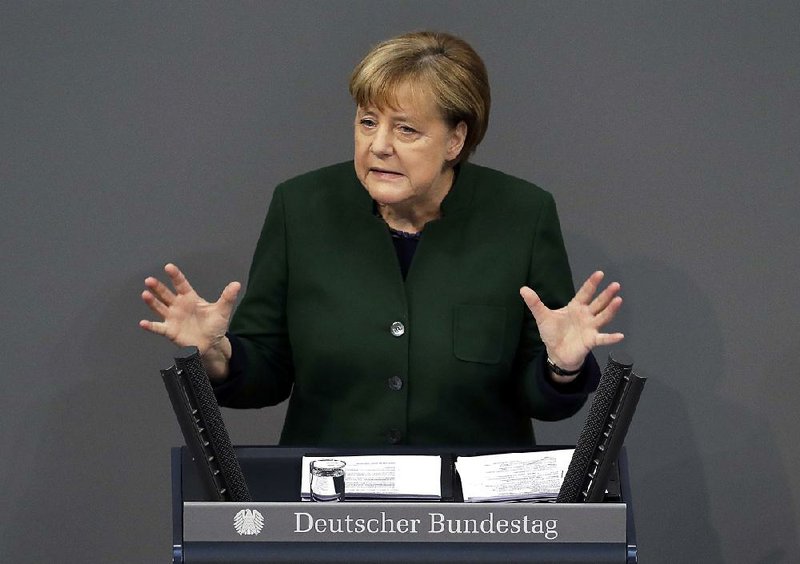BERLIN -- German Chancellor Angela Merkel said Wednesday that she's not happy about the possible demise of the Trans-Pacific Partnership trade agreement, which President-elect Donald Trump wants to pull the U.S. out of. She argued that alternative pacts will be a poor substitute.
RELATED ARTICLES
http://www.arkansas…">Women picks for education, U.N. dealings http://www.arkansas…">Trump's transition to get public's $7M http://www.arkansas…">Private-prison surge seen
Merkel didn't mention Trump directly in a speech to the German Parliament in which she called for nations to take a multilateral approach to solving global problems, but made plain her unease at his approach to major trade pacts.
"I will tell you honestly: I am not happy that the trans-Pacific agreement now will probably not become reality," she said.
"I don't know who will benefit from that -- I want to hold back with forecasts," she added.
[TRUMP: Timeline of president-elect’s career + list of appointments so far]
"I know only one thing: There will be other trade agreements, and they won't have the standards that this agreement and the hoped-for TTIP agreement have. This has to do with jobs under globalization with fair competitive conditions, with shaping globalization in a humane way."
She was referring to the planned Transatlantic Trade and Investment Partnership between the U.S. and the European Union. With Trump coming into office, EU officials are all but certain that that trade deal -- which also faces opposition in parts of Europe, including Germany -- will have to be renegotiated, if any life remains in the project at all.
Trump has described the 12-nation Trans-Pacific Partnership as a "potential disaster for our country." He has also said he wants to renegotiate the North American Free Trade Agreement with Canada and Mexico.
The Trans-Pacific Partnership's possible demise could give a boost to alternative initiatives including one promoted by China in which the United States is not taking part.
China pushes back
On Wednesday, China sought to boost its hand in international trade, pushing back against Trump's threat to use sanctions to win back a competitive trade advantage for the United States.
Speaking at the end of annual U.S.-China trade talks, Zhang Xiangchen, China's deputy trade representative, also disputed the idea that China keeps its currency artificially low to give its exporters a price advantage.
Many economists agree that China no longer manipulates its currency, the yuan.
On the campaign trail, Trump had threatened to slap 45 percent tariffs on Chinese products and to label China a "currency manipulator."
But Zhang warned that Trump will find he is bound by the rules of the World Trade Organization, which restrain countries from imposing sanctions without making a persuasive case for them. China can challenge any sanctions at the organization.
At the meeting, the United States and China agreed to continue working on vexing issues such as China's overproduction of steel. U.S. Trade Representative Michael Froman stressed the importance of keeping the commercial relationship with China "on as even a keel as possible."
But the talks were overshadowed by the prospect of a new administration that vows to take a more aggressive stance toward Chinese trade practices, which, Trump has charged, have wiped out U.S. jobs. He has pointed to the gaping U.S. trade gap with China -- $334 billion last year -- as a key factor in the reduction of those jobs.
The trade gap is the amount by which the value of Chinese products imported to the United States exceeds the value of what the United States exports to China.
The United States and China sold each other $598 billion in goods last year, ahead of the $576 billion the U.S. exchanged with No. 2 Canada.
China is undergoing a difficult transition from economic dependence on exports and investments in real estate and factories to slower growth built around spending by its own consumers. U.S. officials have encouraged the shift, saying it would open opportunities for U.S. companies, especially in services such as banking and law.
In Germany, Merkel made a wider plea for sticking to a multilateral approach in complicated times.
"There are two possibilities for reacting to this," she said. "Either I pull back to myself and my country, I shut myself off, I try to find simple answers to what seems so complicated; or we advocate strengthening our values which we consider right and important not just at home, but try to put them out into the world together with our European partners, together with the United States, together with allies across the world."
"I say that we should seek common ground, count on multilateralism and working together with others to shape globalization," Merkel said.
The chancellor, who announced Sunday that she will seek a fourth term in Germany's election next year, also said the impact of the Internet on media shouldn't be underestimated, noting that "today fake sites, bots and trolls can warp opinion" and that websites' algorithms can amplify opinions.
"We have to learn to deal with this," she said. The phenomenon could be "an interesting question" for Parliament, she added, praising her ministers' efforts to combat online hate speech.
Information for this article was contributed by Paul Wiseman of The Associated Press.
A Section on 11/24/2016
